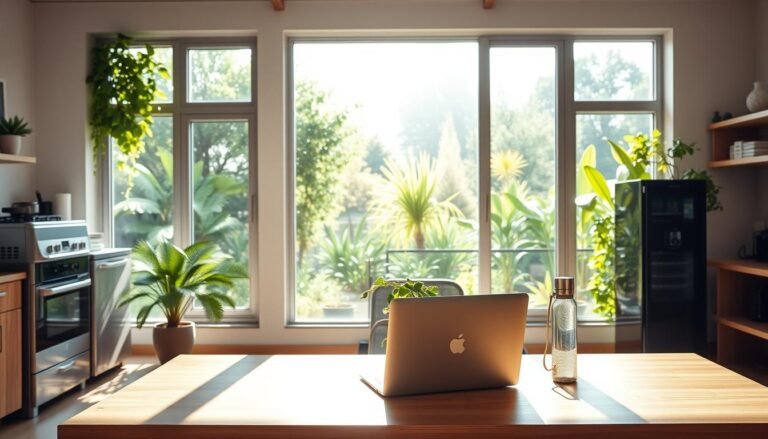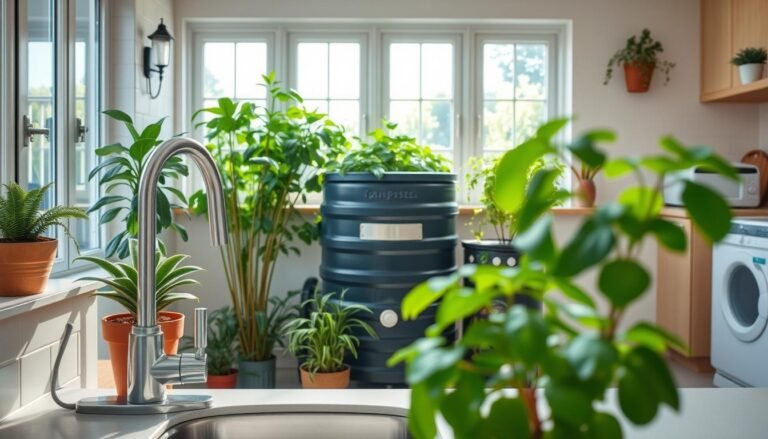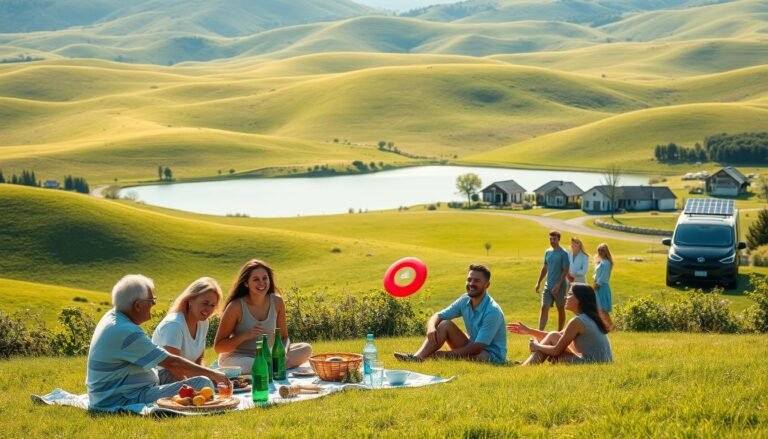As a new family in Australia, you’re likely eager to make a positive impact on the environment for your children’s future. Green parenting is about making conscious choices that reduce waste and promote eco-friendly habits. By adopting sustainable practices, you can help your kids develop a deep appreciation for the planet and its resources.
Raising eco-conscious kids not only benefits the environment, but also instills valuable life skills in your children. By teaching them about the importance of conservation and sustainability, you’re setting them up for a lifetime of responsible decision-making.
Key Takeaways
- Simple changes to daily habits can make a significant impact on reducing waste.
- Involving kids in eco-friendly activities fosters a sense of responsibility and environmental awareness.
- Adopting sustainable practices can be cost-effective and beneficial for the whole family.
- Leading by example is a powerful way to teach children about the importance of conservation.
- Small steps today can lead to a more sustainable tomorrow for your family.
The Growing Importance of Eco-Conscious Parenting in Australia
As Australia faces escalating environmental challenges, the importance of eco-conscious parenting has never been more pronounced. The country’s unique biodiversity and fragile ecosystems make it imperative for families to adopt sustainable practices.
Environmental Challenges Facing Australian Families
Australian families are confronted with numerous environmental challenges, including climate change, water scarcity, and waste management issues. These challenges not only affect the environment but also have a direct impact on the health and wellbeing of family members.
How Family Choices Shape Our Ecological Footprint
The choices made by families significantly influence their ecological footprint. From the products they buy to the energy they consume, every decision counts. For instance, choosing eco-friendly products, reducing energy consumption, and adopting sustainable transportation methods can substantially reduce a family’s ecological footprint.
| Family Choice | Ecological Impact |
|---|---|
| Using public transport or cycling | Reduces carbon emissions |
| Choosing eco-friendly products | Minimizes waste and pollution |
| Conserving water and energy | Reduces resource depletion |
By making informed choices, Australian families can contribute to a more sustainable future. Embracing eco-conscious parenting is not just about reducing their ecological footprint; it’s also about teaching the next generation the importance of living in harmony with the environment.
Starting Your Sustainable Parenting Journey During Pregnancy
Starting your sustainable parenting journey during pregnancy can have a lasting impact on your family’s environmental footprint. As an expectant parent, you’re not only preparing for the arrival of your baby but also setting the stage for a more sustainable future.
Eco-Friendly Maternity Wear Options in Australia
Choosing eco-friendly maternity wear is a great first step. Look for Australian brands that use sustainable materials like organic cotton or recycled fabrics. Brands like Kitty & Co and Lulu & Rose offer stylish and comfortable options that are gentle on the planet.
Creating a Green Nursery with Local Materials
When it comes to creating a green nursery, consider using local materials and sustainable furnishings. Opt for a cot made from sustainably sourced timber and use natural fibers for bedding and curtains. This not only reduces your environmental impact but also creates a healthier space for your baby.
Sustainable Baby Registry Ideas for Aussie Parents
Creating a sustainable baby registry is another way to start your eco-friendly parenting journey. Choose products that are durable, recyclable, or made from sustainable materials. Consider gifting experiences or second-hand items to reduce waste.
| Sustainable Product | Traditional Alternative | Environmental Benefit |
|---|---|---|
| Cloth Nappies | Disposable Nappies | Reduces landfill waste |
| Wooden Toys | Plastic Toys | Sustainable material, durable |
| Natural Fiber Clothing | Synthetic Fiber Clothing | Biodegradable, less microplastic |
By making these conscious choices during pregnancy, you’re taking the first steps towards a more sustainable parenting journey.
Sustainable Parenting Tips for New Families: A Comprehensive Approach
New families can make a significant difference by incorporating simple yet effective sustainable parenting practices into their daily lives. This approach not only benefits the environment but also sets a positive example for the next generation.
Balancing Practicality with Eco-Consciousness
For many new parents, the idea of sustainable parenting can seem daunting. However, it’s about making small, practical changes that add up to make a big difference. It’s not about being perfect; it’s about being mindful of our choices and their impact on the environment.
Small Changes with Big Environmental Impact
Simple actions like using reusable nappies, choosing eco-friendly baby products, and reducing energy consumption can significantly reduce a family’s ecological footprint. For instance, switching to cloth nappies can save hundreds of disposable nappies from landfills.
Setting Realistic Green Parenting Goals
Setting achievable goals is crucial for maintaining a sustainable parenting approach. Start with small, manageable changes and gradually work towards bigger goals. This could mean beginning with recycling, then moving on to more significant changes like reducing plastic use or conserving water.
Involving Partners and Extended Family in Sustainable Practices
Sustainable parenting is more effective when it’s a family effort. Involving partners and extended family members not only shares the responsibility but also educates everyone on the importance of eco-conscious living. Make it a family affair by discussing and implementing sustainable practices together.
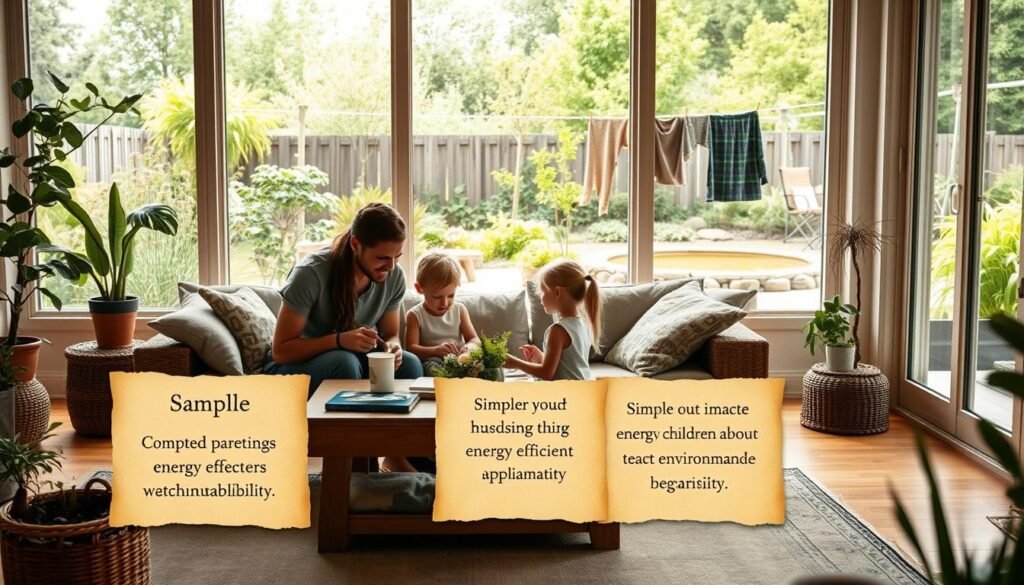
By adopting a comprehensive approach to sustainable parenting, new families can significantly reduce their environmental impact while raising eco-conscious children. It’s about making informed choices, setting realistic goals, and working together as a family to create a more sustainable future.
Navigating the World of Eco-Friendly Nappies
With the growing concern about the environmental impact of traditional nappies, Australian families are now turning towards more sustainable nappy solutions. The decision to switch to eco-friendly nappies is not just about reducing landfill waste; it’s also about adopting a healthier approach to baby care.
Modern Cloth Nappy Systems for Australian Climate
Modern cloth nappy systems have revolutionized the way parents think about nappy usage. Designed to be efficient, comfortable, and adaptable to the Australian climate, these systems offer a practical alternative to disposable nappies. Cloth nappies are not only eco-friendly but also cost-effective in the long run, as they can be reused multiple times.
Local Cloth Nappy Services and Resources
For Australian parents considering cloth nappies, there are numerous local services and resources available. Many cities have cloth nappy cafes where parents can try out different brands and get advice from experienced users. Additionally, online forums and social media groups provide a platform for sharing tips and resources on cloth nappy use.
Biodegradable Disposable Options Available in Australia
For parents who prefer the convenience of disposable nappies, biodegradable options are becoming increasingly available. These nappies are made from materials that break down more easily in landfills, reducing their environmental impact. It’s essential to check the certifications and composition of these biodegradable nappies to ensure they meet your eco-friendly standards.
Creating an Effective Nappy Washing Routine
One of the concerns about using cloth nappies is the additional laundry they generate. However, with a well-organized nappy washing routine, this can be managed efficiently. Pre-washing, using the right detergent, and ensuring thorough drying are key steps in maintaining hygiene and preventing odors. Many parents find that incorporating nappy washing into their daily routine becomes second nature.
Natural Baby Hygiene and Care Products
Natural baby hygiene and care products are becoming the go-to choice for environmentally conscious Australian families. As parents, it’s essential to choose products that are not only safe for your baby but also gentle on the planet.
Australian-Made Natural Baby Care Brands
Several Australian brands are making significant strides in creating natural and eco-friendly baby care products. Brands like Thursday Plantation and Biokleen offer a range of products that are free from harsh chemicals and are gentle on your baby’s skin.
DIY Baby Care Solutions Using Pantry Ingredients
Creating your own baby care products using pantry ingredients is not only cost-effective but also reduces packaging waste. For instance, you can make a natural baby wash using coconut oil and olive oil. This simple recipe is gentle on your baby’s skin and avoids harsh chemicals found in some commercial products.
Reducing Plastic in Your Baby’s Bathroom
Reducing plastic use in your baby’s bathroom routine is easier than you think. Opt for products with minimal or biodegradable packaging, and consider using refillable containers for your baby’s hygiene products. This not only reduces waste but also sets a good example for your child as they grow.
By making these simple changes, you can significantly reduce your environmental footprint while keeping your baby clean and healthy.
Sustainable Feeding Practices from Birth to Toddlerhood
From breastfeeding to introducing solid foods, sustainable feeding practices play a vital role in eco-conscious parenting. As parents navigate the journey of feeding their children, they have numerous opportunities to make choices that benefit both their child’s health and the environment.
Breastfeeding Support Resources in Australia
Breastfeeding is a natural and sustainable way to nourish infants. In Australia, numerous resources are available to support breastfeeding mothers, including lactation consultants, breastfeeding support groups, and online forums. The Australian Breastfeeding Association is a key organization providing guidance, counseling, and support.
Eco-Conscious Formula Feeding When Necessary
For parents who need or choose to formula-feed, there are eco-conscious options available. Some brands offer sustainable formula packaging and environmentally friendly production processes. Parents can also consider formulas made from organic or locally sourced ingredients, reducing the carbon footprint associated with transportation.
Introducing Sustainable Solid Foods with Local Produce
When introducing solid foods, choosing locally sourced, seasonal produce can significantly reduce environmental impact. Parents can opt for organic baby food or prepare their own using locally grown fruits and vegetables, minimizing packaging waste and supporting local farmers.
Reducing Food Waste in the Weaning Stage
During the weaning stage, it’s essential to manage food waste effectively. Parents can achieve this by preparing and freezing food in advance, using up leftovers creatively, and composting food scraps. This not only reduces waste but also teaches children valuable lessons about sustainability.
By adopting these sustainable feeding practices, parents can contribute to a healthier environment for their children to grow and thrive.
Mindful Clothing Choices for Growing Children
The way we dress our children can significantly influence their comfort, health, and environmental footprint. As parents, making mindful clothing choices is a crucial aspect of sustainable parenting. This involves considering not just the style and comfort of clothing, but also its environmental impact.
Organic and Sustainable Fabric Options
Choosing clothing made from organic and sustainable fabrics is a step towards reducing the environmental impact of our children’s wardrobe. Organic cotton, for instance, is grown without the use of toxic pesticides or synthetic fertilizers, making it a healthier choice for children’s sensitive skin. “The benefits of organic fabrics extend beyond just the environmental advantages; they also provide a safer, healthier option for our children,” as noted in a recent article on sustainable clothing.
Embracing Second-Hand Culture: Op Shops and Swap Meets
Embracing second-hand culture is another mindful approach to children’s clothing. Op shops and swap meets offer a treasure trove of gently used clothing that can be a more sustainable and affordable option. This not only reduces waste but also teaches children the value of reuse and recycling.
Australian Eco-Friendly Children’s Clothing Brands
Australia is home to several eco-friendly children’s clothing brands that prioritize sustainability without compromising on style. Brands that use organic materials, minimize waste, and adopt environmentally friendly production methods are leading the way in sustainable fashion for kids.
By making informed choices about our children’s clothing, we can contribute to a more sustainable future. It’s about embracing a mindset that values both the well-being of our children and the health of the planet.
Minimalist Approach to Baby Gear and Toys
As new families navigate the world of parenting, adopting a minimalist approach to baby essentials can significantly reduce environmental impact. This approach not only simplifies family life but also contributes to a more sustainable future.
Essential vs. Optional Baby Equipment
Distinguishing between essential and optional baby equipment is crucial. Essentials include items like a safe sleeping environment, a comfortable stroller, and necessary feeding equipment. Optional items, on the other hand, can often be substituted or eliminated altogether.
- Necessary items: crib, stroller, baby monitor
- Optional items: baby gym, baby music player
Sustainable Toy Materials and Brands
Choosing toys made from sustainable materials is a key aspect of minimalist parenting. Look for brands that use natural, non-toxic materials and have minimal packaging.
- Grimm’s Wooden Toys
- HABA
Toy Libraries and Sharing Systems Across Australia
Utilizing toy libraries and sharing systems is an innovative way to reduce waste and provide children with a variety of toys without the need for constant purchases.
“Toy libraries offer a wonderful way to access a wide range of toys while promoting sustainability and community interaction.” – Green Parenting Expert
Creating Open-Ended Play Spaces with Natural Materials
Designing play areas with natural materials encourages creativity and reduces the need for manufactured toys. Consider using:
- Natural woods
- Recycled materials
- Outdoor spaces for exploration
Creating an Eco-Friendly Home Environment
As a parent, making your home eco-friendly is a powerful way to model sustainable living for your children. This involves making conscious choices about the products you use, the energy you consume, and the waste you generate.
Non-Toxic Cleaning Solutions Safe for Young Children
Switching to non-toxic cleaning solutions is a simple yet effective way to create a healthier home environment. Many conventional cleaning products contain harsh chemicals that can be harmful to children and pets. Consider using natural alternatives like vinegar, baking soda, and lemon juice, which are effective and safe.
You can also opt for eco-friendly cleaning products that are specifically designed for families. Look for products with natural ingredients and minimal packaging.
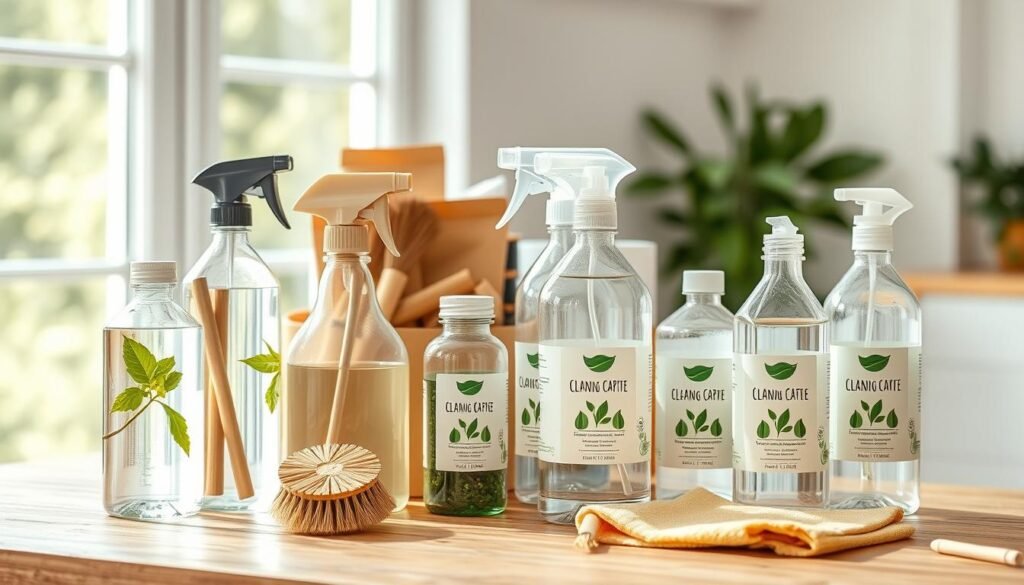
Energy and Water Conservation Strategies for Australian Homes
Conserving energy and water is crucial for reducing your household’s environmental footprint. Simple actions like turning off lights when not in use, using energy-efficient appliances, and taking shorter showers can make a significant difference.
Consider installing solar panels or investing in a rainwater tank to further reduce your energy and water consumption.
Family-Friendly Recycling and Composting Systems
Implementing a recycling and composting system is an excellent way to reduce waste and teach children about the importance of sustainability. Start by setting up a recycling bin and educating your family on what can be recycled.
Composting is another effective way to reduce waste and create nutrient-rich soil for your garden. You can start with a simple compost bin or even a worm farm.
By implementing these strategies, you can create an eco-friendly home environment that benefits both your family and the planet.
Sustainable Transportation for Growing Families
Sustainable transportation is a crucial aspect of eco-conscious parenting in Australia, offering numerous benefits for growing families. As children grow, their transportation needs change, requiring parents to adapt their strategies to maintain a sustainable lifestyle.
Family-Friendly Cycling Infrastructure
Australia’s cities are increasingly investing in cycling infrastructure, making it safer and more appealing for families to choose cycling as a mode of transportation. Family-friendly cycling paths are being developed with wider lanes and improved signage, encouraging parents to cycle with their children.
“Cycling is not just a mode of transport; it’s a way to instill a love for the outdoors and physical activity in children,” says a spokesperson from Cycling Australia.
Navigating Public Transport with Young Children
Public transport is another vital component of sustainable transportation for families. Australian cities are enhancing their public transport systems to be more stroller-friendly and accommodating for young children. This includes accessible stations and buses designed for families.
- Plan your route in advance to avoid peak hours.
- Use stroller-friendly public transport options.
- Teach children about public transport etiquette.
Eco-Conscious Car Choices for Australian Family Life
For many families, cars remain a necessary part of their transportation mix. Choosing an eco-conscious car can significantly reduce a family’s carbon footprint. Electric and hybrid vehicles are becoming increasingly popular among Australian families due to their environmental benefits and lower running costs.
“The shift towards electric vehicles is a significant step in reducing our carbon footprint. It’s a decision that aligns with our values of sustainability and responsibility towards the environment.” – Quote from an Australian electric vehicle owner.
By considering these sustainable transportation options, Australian families can make a positive impact on the environment while also promoting healthy lifestyles for their children.
Connecting Children with Australia’s Natural Environment
Connecting children with nature is a crucial aspect of sustainable parenting in Australia. By introducing kids to the country’s diverse natural environments, parents can foster a deep appreciation for the environment and encourage eco-conscious behaviors from a young age.
Age-Appropriate Bush and Beach Activities
Australia’s bush and beaches offer a wide range of activities suitable for children of all ages. For younger kids, simple beachcombing or playing in the sand can be a great introduction to nature. Older children can enjoy more adventurous activities like hiking, kayaking, or snorkeling in marine reserves.
- Beach activities: swimming, surfing, or building sandcastles
- Bushwalking: exploring trails, identifying native plants, and spotting wildlife
- Water sports: kayaking, paddleboarding, or sailing
Teaching Children About Native Flora and Fauna
Educating children about Australia’s unique flora and fauna is an essential part of connecting them with nature. Parents can use various resources, such as guided tours, nature documentaries, or interactive apps, to teach kids about the local ecosystem.
Some ways to engage children include:
- Creating a backyard habitat for native wildlife
- Participating in citizen science projects
- Visiting national parks or wildlife sanctuaries
Creating Nature-Based Family Traditions Around Australian Seasons
Establishing family traditions that celebrate Australia’s changing seasons can help children develop a deeper connection with the natural world. This could involve activities like:
- Having a spring picnic in a nearby park
- Enjoying summer camping trips
- Observing autumn leaf changes
- Participating in winter whale watching
Responsible Wildlife Encounters for Young Children
When interacting with wildlife, it’s crucial to teach children about responsible behavior. This includes respecting animals’ space, not feeding them, and understanding the importance of conservation.
By instilling these values, parents can help create a new generation of nature lovers who appreciate and protect Australia’s unique environment.
Teaching Environmental Values to Young Children
As parents, one of the most significant gifts we can give our children is a deep appreciation for the natural world. This appreciation forms the foundation for teaching environmental values, a crucial aspect of raising eco-conscious kids. By instilling these values early, we empower our children to make sustainable choices throughout their lives.
Age-Appropriate Environmental Education
Environmental education should be tailored to a child’s age and developmental stage. For younger children, this might involve simple activities like planting a garden or observing the local wildlife. As children grow older, they can participate in more complex projects, such as creating a recycling program or reducing household energy consumption.
“The greatest sign of success for a teacher is to be able to say, ‘The children are now working as if I did not exist.'” – Maria Montessori. This quote encapsulates the goal of environmental education: to empower children to become independent stewards of the earth.
Modelling Sustainable Behaviours in Daily Life
Children learn by observing the adults around them, making it crucial for parents to model sustainable behaviours. Simple actions like reducing waste, conserving water, and using public transport can have a significant impact when done consistently. By involving children in these processes, we teach them the value of sustainability in action.
- Reduce, Reuse, Recycle: Implementing a recycling system at home.
- Conserve Water: Fixing leaks and teaching children to turn off taps.
- Eco-Friendly Transport: Choosing walking, cycling, or public transport for family outings.
Celebrating Earth-Friendly Milestones and Achievements
Celebrating milestones related to environmental stewardship encourages children to continue their eco-friendly efforts. Whether it’s a “no waste week” or a successful recycling challenge, acknowledging these achievements reinforces positive behaviours.
“In every walk with nature, one receives far more than he seeks.” – John Muir. This quote highlights the reciprocal relationship between humans and nature, a principle that can guide our teaching of environmental values.
By combining age-appropriate education, modelling sustainable behaviours, and celebrating achievements, we can effectively teach environmental values to young children. This holistic approach not only benefits the planet but also enriches the lives of our children, fostering a deeper connection with the natural world.
Building a Community of Eco-Conscious Families
Building a network of green parents can provide valuable support and resources for families committed to sustainability. As the importance of eco-conscious parenting grows, so does the need for communities that can share knowledge, resources, and encouragement.
Finding Green Parent Groups in Your Australian Community
Connecting with local eco-conscious families can be a great way to start your journey. Look for community centers, parks, or online platforms that host events or groups focused on sustainable living and green parenting.
Online Resources and Forums for Sustainable Parenting
The digital world offers a wealth of information and connection opportunities for eco-conscious parents. Some popular online platforms include:
- Facebook groups dedicated to sustainable parenting
- Specialized forums like Eco Parenting Australia
- Blogs and websites sharing eco-friendly parenting tips
Advocating for Eco-Friendly Practices in Schools and Childcare
As a community, eco-conscious families can make a significant impact by advocating for greener practices in educational settings. This can include initiatives like recycling programs, energy-efficient lighting, and environmental education.
| Initiative | Impact | Implementation |
|---|---|---|
| Recycling Programs | Reduces waste | Work with school administration to set up recycling bins |
| Energy-Efficient Lighting | Lowers energy consumption | Advocate for LED lighting installation |
| Environmental Education | Promotes eco-awareness | Integrate environmental topics into the curriculum |
By working together, eco-conscious families can create a lasting impact on their communities and raise a generation of environmentally aware children.
Conclusion: Raising the Next Generation of Environmental Stewards
Raising eco-conscious kids is a vital task for modern parents in Australia. By adopting sustainable parenting practices, families can significantly reduce their ecological footprint and contribute to a healthier environment for future generations.
The journey to raising environmental stewards begins with small, everyday choices. From eco-friendly nappies and natural baby care products to sustainable feeding practices and mindful clothing choices, every decision counts.
By involving children in nature-based activities and teaching them about environmental conservation, parents can instill a deep appreciation for the natural world. This not only shapes their values but also empowers them to make a positive impact as they grow.
As parents, you play a crucial role in shaping the next generation of environmental stewards. By embracing sustainable parenting practices and fostering a connection with nature, you can help raise children who are not only eco-conscious but also actively engaged in protecting the planet.

